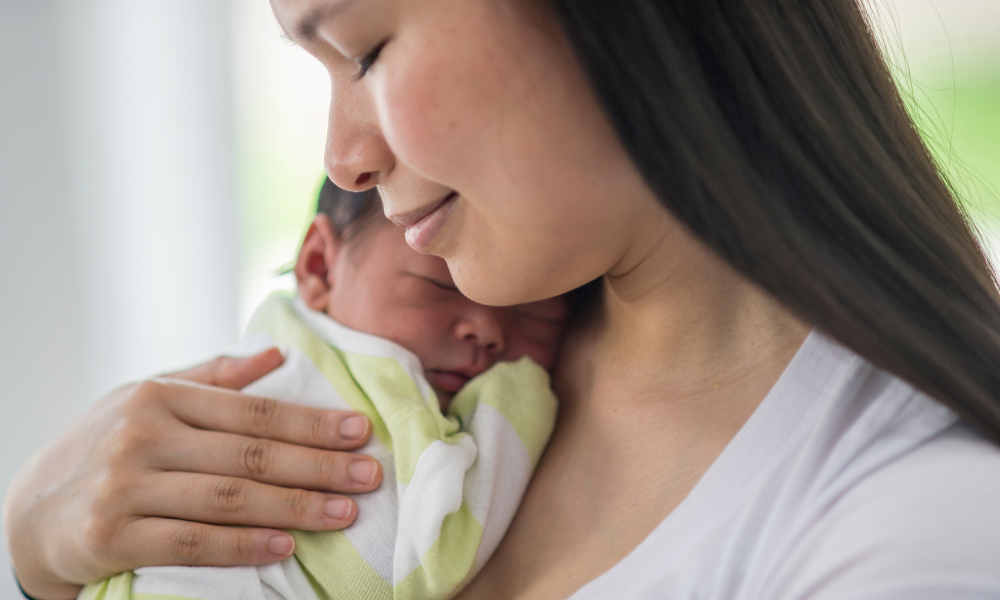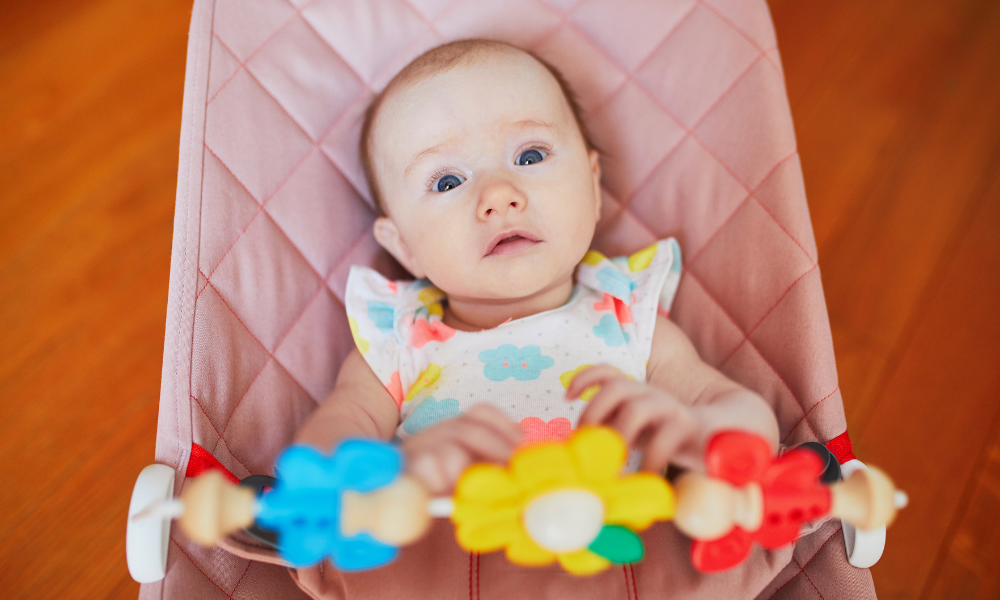My 6 Week Old Baby Wont Let Me Put Him Down
A Biological Need to Be Close to You
Have you ever noticed that your newborn can be sleeping comfortably on your chest but as soon as you try to sit down, they wake up crying, insisting that you stand, bounce, or walk around with them? Human nature is amazing and this response is part of the fight or flight response. If a caregiver is standing up and holding a helpless baby, they are ready in case they need to run away from danger. If they are sitting or laying down, it would take more time to get away.

Why Does Your Baby Cry When You Sit Down?
Babies feel secure when you're walking
A study was done showing how baby mice prefer to be held by the nape of their necks by their mothers, for the same reason. The mom can get them away from danger quicker. When the mother mouse picks the baby up, they go limp. It's easier for a mouse to hold her baby when they aren't wiggling. This is also why babies calm down when they are being held in a standing position, it's easier for both the parent and baby to escape quickly if needed.
YOU'LL ALSO LOVE: TIPS FOR INCREASING BREASTMILK SUPPLY
Being held affects a baby's heartbeat
The same study showed that infants under 6 months old who were being carried by their mother had a rapid heart decrease and stopped crying, compared to a mother who was sitting. Parents might still be stressed out at having to constant move with their newborn babe but by understanding that this behavior is part of human evolution, they can see that it's normal and there is a reason for it.

Wonder why baby's fall asleep easily while in your arms? Being held helps regulate their heartbeat.
Babies Need to be Held...A Lot
Babies need to be held. Babies need to be touched. Hugging, holding, snuggling, babywearing, and skin-to-skin are all ways that we can love our babies and help them to feel safe and secure. It can also help to offset any newborn trauma they may have endured.
Should You Use Baby Bouncers and Swings?
In our modern world, we see ads for products that make it easy to not have to pick up your baby as often as you might without them. There are bouncy seats, swings, pack n' plays, strollers, walkers, portable bassinets, and even car seats that turn into strollers so that you never have to pick your baby up going from car to shopping and back to car. Heck, there are even swings that turn themselves on when your baby starts to cry so that you don't have to pick them up. Of course, as parents, we all need relief, and using these occasionally doesn't do harm.
DON'T MISS: ARE YOU BLOCKING EMPATHY? FIND OUT.
Humans Are Meant to Carry Their Young
But humans are a carry species. We have the largest brains of any primate yet our babies rely on us for a long period of time. Human babies are in utero for nine months and once they are out in the world, they enter the fourth trimester. During this time, babies need to be held and they will often cry as soon as they are put down. This can be stressful for the parents but it's perfectly normal. The idea that babies can self-soothe is a myth.

Occasional use of bouncers or swings can be a welcome relief for parents.
You Can't Spoil a Baby with Love
Children are spoiled with material things, not affection
After being in the comforting and warm womb for nine months (ideally), it's no wonder that babies crave the comfort of their parents. The world is a big and scary place for a newborn. It is full of new sights, sounds, scents and it takes time to adjust. Being held and snuggled in warm, soft arms, close to the soothing beat and vibration of a heartbeat, feels more like the womb than being set down in a contraption.
So go on and snuggle your baby and don't let anyone tell you that you will spoil them. You can't spoil a baby with love.
MUST READ: HOW READING AFFECTS YOUR CHILD'S DEVELOPMENT
FAQs About Crying Babies
How can I stop my baby from crying when I put her down?Unfortunately, there's no magic answer here. Your baby needs you to hold her to develop a secure attachment and as she develops it, you'll be able to put her down more easily. In the meantime, enlist the help of family and friends whenever possible, and look into a hands-free baby carrier, which can be a life saver when you need to get things done.
Q: What do I do if my baby wants to be held all the time? If your baby wants to be held all the time your baby is 100% perfectly typical. We've unfortunately been sold a lie about what to expect from babies. Mothers also used to have a lot of help - it was normal for a child to have up to 12 caregivers in the form of extended family and siblings up until relatively recent times. As much as you can, meet your baby's needs and when a friend says, "Is there anything you need?" say "Yes! I could really use [dinner, a baby sitter for an hour, a shower]" Too often we don't speak up and think we're supposed to be able to do it all...we're not!
Q. How do I teach my baby to self-soothe and self-settle?Like the many myths we've been told about baby sleep, self-soothing is simply not a skill babies have or can be taught. Self-soothing is all about emotional regulation and baby's brains simply aren't developed enough to do that. Read more about the self-soothing myth here.
More Frequently Asked Questions by Parents
What should I do if my baby cries when put down?
Crying is communication and when you put your baby to bed and they cry, they're communicating that they still need to be in your arms. Crying is also completely normal and it will likely take months before your child feels secure being alone. You can practice putting your baby down in the crib during wake times and patting them gently as well as verbally reassuring your little one that you're there and they're safe.
Always make sure your little one isn't hungry, create a healthy sleep environment, ensuring that the room is dark, a comfortable temperature, and there's little noise.
New parents may want to consider that some babies never like to sleep in a crib and think about co-sleeping as an option.
What is the correct way to put my baby down?
Always put your baby on their back to sleep and try to keep your baby on their backs throughout the night. Make sure that the crib is empty before placing your baby down and keep the room at a comfortable temperature for them to fall asleep in.
At what age do babies stop crying when being put to sleep?
All babies will take different amounts of time to stop crying when being put down. Many infants will be through the worst of the crying by four months old. At this age, your baby may start to sleep for longer hours and putting them to sleep may be easier. But, don't be surprised if your little one isn't ready to nap and sleep without being in contact with your body at that age. All babies are different and their sleep patterns change constantly in the first weeks, months, and even years. Just when it seems you've gotten it figured out and your baby's sleeping through the night, an illness, regression, teething, or other change hits and your baby's back to crying at all hours.
Should I put my baby down drowsy, but awake?
New parents are often given the advice to put their infants down drowsy, but awake. The theory is that if you start this pattern early and do it every time, your baby won't cry when place in their crib to sleep and they'll be more likely to sleep through the night.
While you could certainly try this, it seems that for most parents, weeks are spent following this advice and your child is still crying every time they're set down to sleep, and both adults and infants end up with anxiety around bedtime.
How do I know if my baby has colic?
Colic is frequent, prolonged crying by a healthy child who isn't hungry, in need of a clean diaper, or in obvious pain. Colic is difficult, as listening to the noise of a baby cry at all hours of the day and night can lead to anxiety for mom and dad who are already sleep deprived and stressed. If your baby is crying excessively, first call your pediatrician and schedule an appointment to rule out any medical issues or health concerns.
If possible, set up a network of friends and family who you can call on for support. If someone can watch your child while you get out of the house alone for a few hours, it can help you stay calm when dealing with a fussy baby. Taking care of your mental health is crucial for your parenting so pay attention to how you're feeling and call for help when life with a little one gets overwhelming.
By the time you have a four-month-old, colic will generally pass and your infant will be less fussy.
Does feeding a baby cereal in their bottle help them sleep through the night?
Feeding a baby cereal in their bottle to help them fall asleep and wake less often is an old wive's tale that could be dangerous. Not only can it lead to choking, but your baby's body is still developing and their digestive system may not be ready for solids. When you feed a baby cereal or other solids too early, it can lead to health problems later in life, like obesity.
Instead of feeding your baby cereal at bedtime, create a bedtime routine that they become accustomed to and will associate with sleep.
Paper Pinecone is the #1 most trusted childcare directory giving parents access to the best preschools and best daycares near you. Parents always search free and childcare providers always list free . Send inquiries about the best daycares and preschools to questions@paperpinecone.com.
This post may contain affiliate links.
My 6 Week Old Baby Wont Let Me Put Him Down
Source: https://www.paperpinecone.com/blog/why-your-baby-cries-when-you-put-her-down
0 Response to "My 6 Week Old Baby Wont Let Me Put Him Down"
Post a Comment